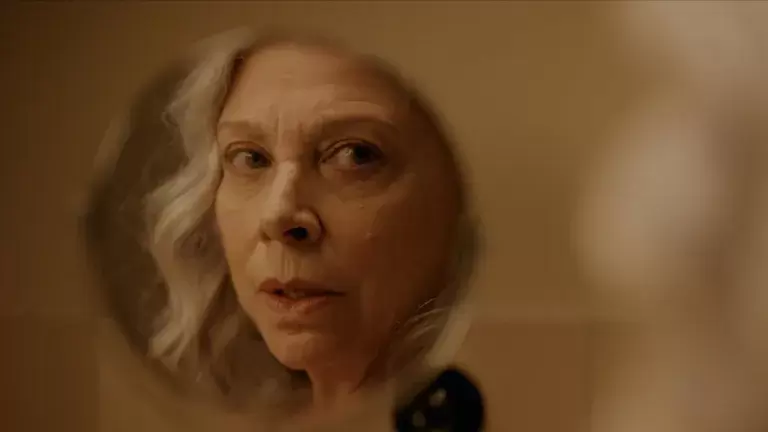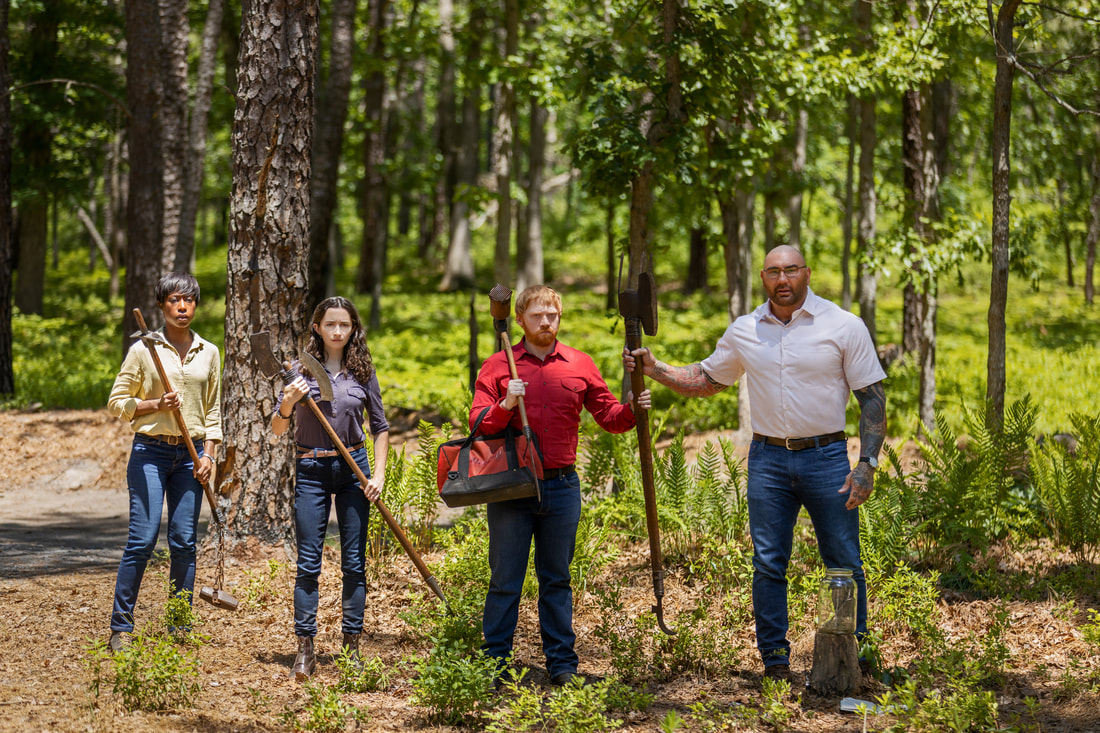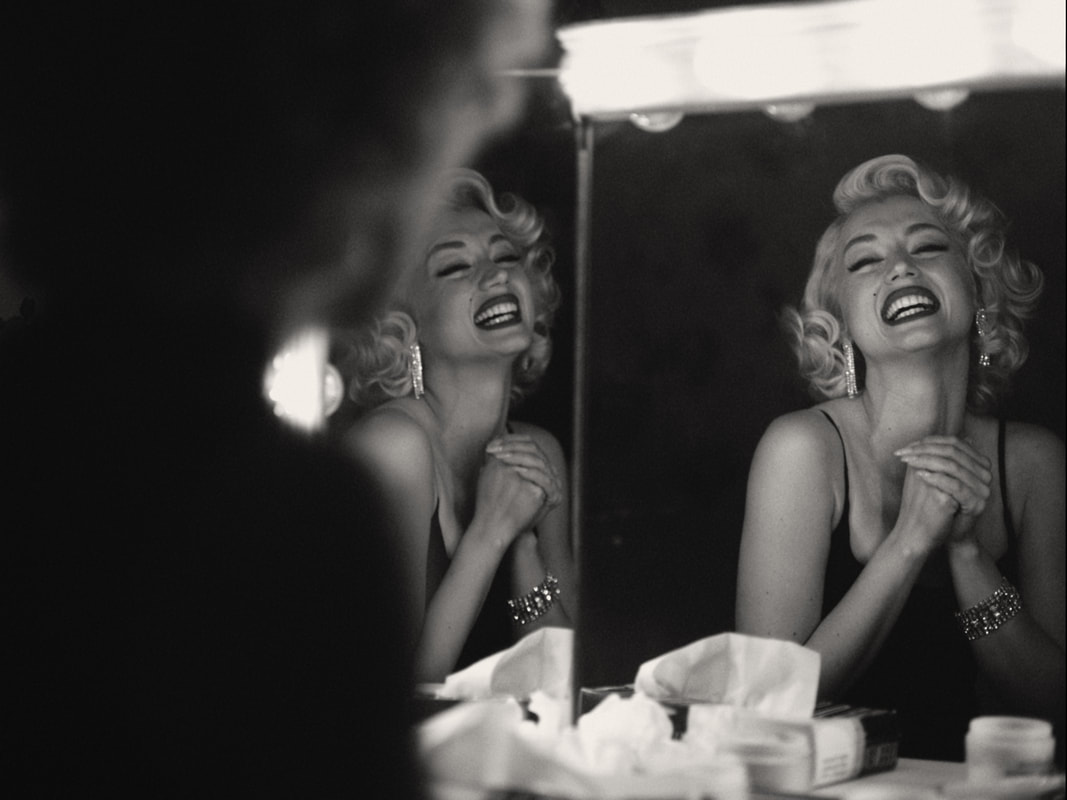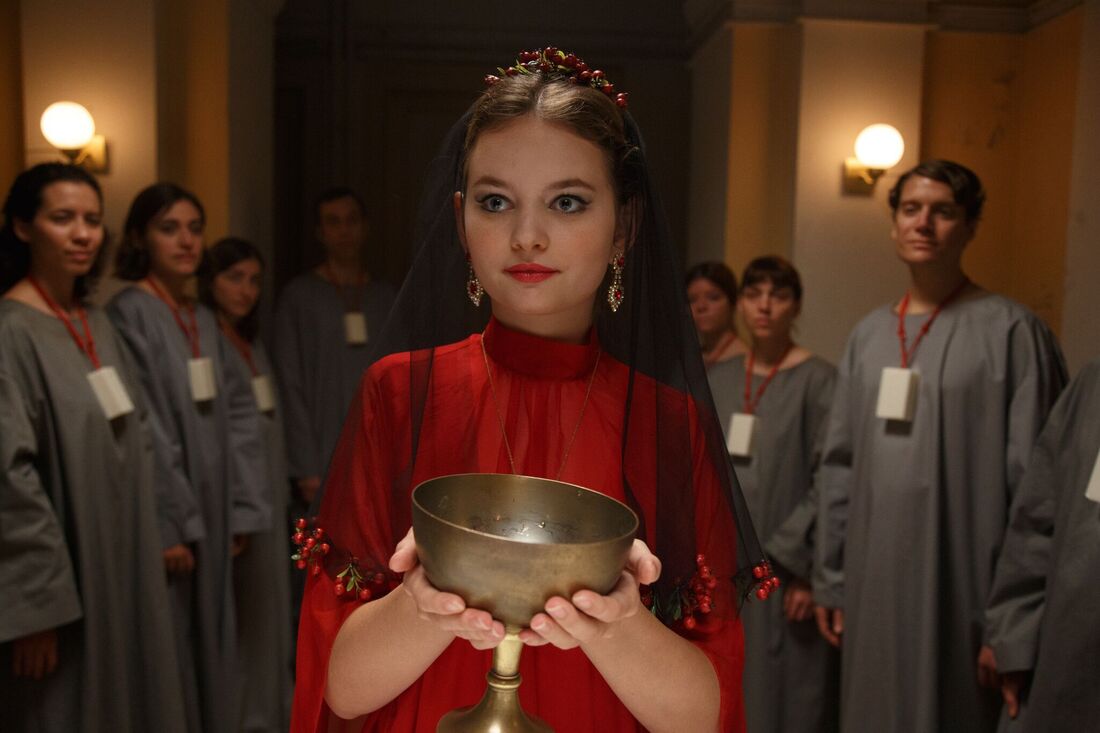|
Originally published on Elements of Madness.  L-R: Michelle McLeod stars as Mejal, Sheila McCarthy as Greta, Liv McNeil as Neitje, Jessie Buckley as Mariche, Claire Foy as Salome, Kate Hallett as Autje, Rooney Mara as Ona and Judith Ivey as Agata in director Sarah Polley’s film WOMEN TALKING. An Orion Pictures Release. Photo credit: Michael Gibson. © 2022 Orion Releasing LLC. All Rights Reserved. With an impressive cast, best-selling source material, two Oscar nominations, and one Oscar win, Women Talking has gotten a lot of buzz. Unlike some of this year’s other best picture nominees, Women Talking isn’t supposed to entertain crowds or draw hordes of movie fans to the box office. It’s supposed to make you think. Written and directed by Sarah Polley (Take This Waltz), the film is based on Miriam Toews’s novel of the same name which is inspired by events that occurred in an isolated Mennonite community in Bolivia. The novel explores what might have happened if women in the community had met in secret to decide what to do about ongoing sexual abuse. Together, they must figure out if they will leave, stay and fight, or do nothing. They carefully consider the pros and cons of each option, and they must ultimately choose between the familiarity and religious security of their community and the potential freedom they might experience in a world they know nothing about.
0 Comments
Originally published on Elements of Madness. When director Patricia Ortega found a revealing picture of her mother as a young woman, scantily clad in an open bathrobe, she didn’t recoil in embarrassment. She made a movie about it. Ortega was surprised by such a blatant display of sexuality from a Catholic woman whom she had only ever known as a mother, and she wanted to explore the role of passion, desire, and sexuality in older women. The main character of her film, Mamacruz, is a 70-something-year-old grandmother who earns a living doing small sewing jobs and taking care of the icons and figurines in the local Catholic Church. Cruz (Kiti Mánver) is also learning how to use a tablet so she can keep in touch with her daughter, who is in a dance company in Vienna. When Cruz accidentally stumbles upon pornography while messing around on the tablet, she begins a journey of self-discovery and seeks to reignite her sense of passion and pleasure. Despite the strictness of her religious community and the societal expectations for women her age, Cruz finds that there’s a lot more she could be getting out of life.
Maria Schrader Seeks to Honor the #MeToo Movement in “She Said,” Available on Home Video Now2/10/2024 Originally published on Elements of Madness. While the real-life work of an investigative journalist might feel like running head-first into a brick wall over and over again, movies and shows usually make it seem like an idealistic, noble, and exciting job that combines the thrill of detective work with the glamorous life of a writer. The 2022 movie She Said, directed by Maria Schrader (I’m Your Man) and written by Rebecca Lenkiewicz (Small Axe), highlights the work of two real-life investigative journalists, Jodi Kantor (Zoe Kazan) and Megan Twohey (Carey Mulligan). The movie portrays Kantor and Twohey as confident, career-driven women who balance their roles as journalists and mothers just as skillfully as they balance their morning cups of coffee as they make their ways through the bustling stress of the city into the prestigious New York Times building. But She Said isn’t all #girlbossing and go-getting. It’s bleak, slow, and depressing, trapped under a melancholy gray cloud that sets an appropriate tone for the story. In 2017, Kantor and Twohey published a story in the New York Times that exposed decades of abuse and misconduct by Hollywood producer Harvey Weinstein. While the story gave hundreds of women the courage to share their own stories about abuse and survival, it was initially very difficult for Kantor and Twohey to find women who were willing to risk their careers and reputations by going on the record about Weinstein’s misconduct (some of these women also risked legal action since Weinstein silenced several of the women he abused with settlements). She Said recounts Kantor and Twohey’s investigative process and the painstaking steps they took to shed light on systemic abuse in Hollywood.
Originally published on Elements of Madness. The title of Gina Prince-Bythewood’s latest film alone is enough to inspire strength, courage, and bravery. The movie itself, The Woman King, lives up to the inspirational connotations of its name. Set in West Africa in 1823, the story focuses on the Agojie, an all-female group of tough and fearless warriors who are dedicated to protecting the kingdom of Dahomey. Filled with beautiful costumes, expansive scenery shot on-location in Africa, powerful dance and fight choreography, and a deep-rooted sense of genuine sisterhood, The Woman King is a joy to watch. The outstanding cast brings lots of passion to the screen, but at times their efforts are undermined by a weak script. The narrative hiccups and uneven tone, however, aren’t enough to rob The Woman King of its power.
Originally posted on Elements of Madness. We’ve all been to at least one work event that went incredibly sour, but the average person’s worst day at the office has nothing on the nightmare of a client dinner that unfolds in Run Sweetheart Run. When pre-law student and single mom Cherie (Ella Balinska) puts on her best dress to meet one of her boss’s top clients for dinner, she has no idea that she’s about to experience the worst night of her life. The client, Ethan (Pilou Asbæk), is handsome, educated, sweet, charming, and filthy rich. He takes Cherie out to the best sushi spot in LA, followed by an impromptu trip to a skating rink, and the business dinner soon becomes a date. Cherie decides to return home with Ethan for a few drinks, but things take a turn for the worst. After starting the evening with high hopes for both her love life and her career, Cherie finds herself running all night from a crazed, violent, and relentless stalker who’s out for blood. All bets are off in Ethan’s sadistic, devilish game, and Cherie must rely on pure survival instincts and summon her innermost strength in order to have any chance of lasting the night.
Could You Make the Choice? M. Night Shyamalan Puts Certainty on Trial in KNOCK AT THE CABIN2/2/2023 If your expectations for Knock at the Cabin are based solely on M. Night Shyamalan’s previous film, Old (2021), those expectations probably aren’t high. Despite its fascinating concept, Old is stiff and awkward with unbalanced performances and an unrefined script. You might be tempted to make the same judgment about Knock at the Cabin after watching the first five minutes. The movie opens with stiff, over-rehearsed dialogue and awkward closeups that create an uneven tone and set a low bar for the rest of the movie. With vintage horror aesthetics in the opening credits and a creepy yet playful score, it’s difficult to tell whether or not Knock at the Cabin is taking itself seriously. But gradually, and then all at once, the tone becomes deadly serious. As the plot develops, it’s clear that Knock at the Cabin doesn’t suffer from the same problems as Old. M. Night Shyamalan’s latest film is a vicious, relentless mind game propelled by surprising and intense performances. With a script that gets exponentially better along the way, Knock at the Cabin far exceeds expectations.
“She Said” Forgoes Explicit Trauma and Emotional Manipulation in Order to Respect Survivors of Abuse11/17/2022 When a story about a crime or scandal breaks, you can bet that there’s a movie producer somewhere who’s already in negotiations over the rights to that story — and I can’t blame them. Humans are naturally curious, and there’s something inherently intriguing about the psychology of serial killers and the complex webs of events behind white-collar crimes. In October of 2017, when journalists Jodi Kantor and Megan Twohey published a story that exposed the crimes of Harvey Weinstein, producers Dede Gardner and Jeremy Kleiner had acquired rights to a movie version of the story within a few months. The hasty move seems, at first glance, exploitative and unethical. Why would anyone be in such a rush to make a movie about such a personal and traumatic topic? Can you make such a movie that doesn’t exploit the painful memories of the survivors? But after watching She Said, it’s clear that Gardner and Kleiner, along with director Maria Schrader and writer Rebecca Lenkiewicz, had one goal in mind: to give voice to the survivors in a truthful and respectful way. Weinstein, who is now behind bars, received more than enough attention both before and after the allegations broke. She Said works to shift the conversation about sexual abuse in Hollywood from the perpetrators to the survivors.
When you settle into your reclining theater seat with your favorite movie snacks to watch the anticipated Black Panther: Wakanda Forever (preferably in an IMAX theater, which is definitely worth the extra dollars), you can expect a strong story brought to life by a dedicated cast. While the movie honors the late Chadwick Boseman and the character he brought to the screen in the first Black Panther movie (2018), Wakanda Forever isn’t stuck in the past. Nor is it a sluggish transitional sequel, as the second installments in film franchises often are. It’s an exciting, emotionally gripping, aurally immersive, and visually impressive Marvel movie that is, on every level, a modern-day epic. It follows the stylistic and aesthetic patterns set by its predecessor, keeping director Ryan Coogler’s vision for Wakanda alive. It also introduces a few new characters to the Marvel Cinematic Universe, including Namor (Tenoch Huerta Mejía), the ruler of a stunning underwater kingdom. But the glue that holds the colorful costumes, otherworldly sets, and epic fight scenes together is Shuri (Letitia Wright), princess of Wakanda and sister to the late King T’Challa. Her story and development are what make Wakanda Forever, the second longest movie in the MCU, worth every minute.
Content / trigger warning: Blonde contains flashing and strobing effect imagery that may be triggering to those with photosensitivity. Blonde is rated NC-17 for some sexual content. It contains frightening and intense images involving abuse, assault, and abortion. These topics are briefly discussed in the review below. Blonde isn’t the feel-good biopic you’re looking for. Nor is it a sentimental tear-jerker. Andrew Dominik’s 2-hour and 46-minute adaptation of the Joyce Carol Oates novel is difficult, depressing, and demanding. It’s the kind of movie that made me tell my parents, “Don’t watch it, you won’t like it” (although the MPAA rating alone would have been enough to turn them away). But as I watched, I also felt that I, as a critic, wasn’t supposed to like it. With so many unconventional stylistic elements at play and so much controversial content, I felt like the only “correct” review I could give would be to call the movie problematic and pretentious. However, that review wouldn’t be genuine. There are certain shots, sequences, scenes, and techniques in Blonde that really don’t work — and yet, I found myself completely engaged with the film, not wanting it to end. It wasn’t until the JFK blowjob scene when a male critic in the audience burst out laughing (to my extreme annoyance, as I was sympathizing with Marilyn’s perspective and admiring what the scene had to say about sexual power dynamics) that I figured out what Blonde was doing right. It was making me aware of myself as a woman, as a critic, as a movie lover, and as a human. Blonde gave me one of the most powerful and visceral experiences I’ve had at the movies in a long time. For that reason, I don’t want to focus on all the little things that didn’t work. Instead, I want to focus on a few big things that it got right. After all, any movie that makes you more aware of yourself has to be doing something right.
Originally published on Elements of Madness. One of the scariest things about cults is that they can form right under our noses. Cult leaders need to psychologically isolate their followers in order to maintain control, but they don’t have to keep everyone on a remote island in order to do so. Still, perhaps the best way to illustrate the intense psychological control that cult leaders achieve is to tell a story about a cult that’s geographically isolated from the real world. Perhaps the best way to demonstrate how a deeply disturbed man could earn the trust and respect of a whole community of devout followers is to confine that man and his followers to a remote location that seems to exist in a universe of its own. In Nikias Chryssos’s A Pure Place, a sickeningly imaginative film that he wrote with Lars Henning Jung, the entire population of a remote Greek island is under the spell of a charming and charismatic leader named Fust (Sam Louwyck). This deeply disturbed (but powerful) man is utterly obsessed with cleanliness, and he’s positioned himself as a savior who will lead the people to a pure place that’s free from man’s worst enemy: dirt. In addition to following Fust, the community also worships Hygeia, the Greek goddess of cleanliness. The cult is intense and otherworldly, so separated from the real world that Fust’s twisted desires have become the only law. The one thing connecting this mysterious island to the outside world is the product that Fust’s followers make in his factory: soap.
|
"Our embodied spectator, possibly perverse in her fantasies and diverse in her experience, possesses agency...finally, she must now be held accountable for it." Categories
All
|












